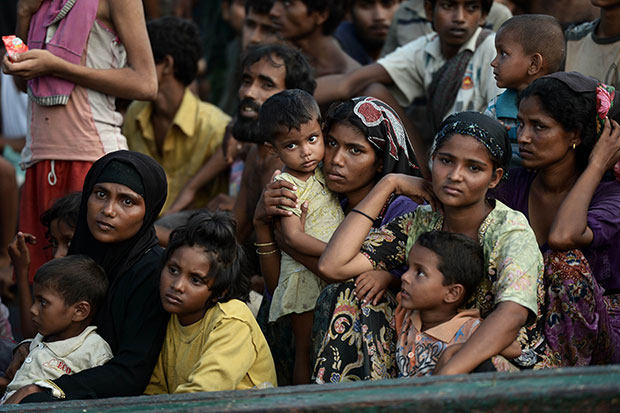
Myanmar may snub a regional meeting hosted by Thailand later this month aimed at easing the current Bay of Bengal migrant crisis, the president's office said Friday.
Hundreds of boatpeople have arrived on Thai, Malaysian and Indonesian soil since May 1, when the discovery of mass graves believed to belong to Bangladeshi and Myanmar migrants in southern Thailand prompted a crackdown on trafficking and smugglers responded by abandoning their human cargo.
Thai authorities, who have been accused of turning a blind eye -- and also complicity in -- the trade, called a May 29 regional meeting in Bangkok to address the "root causes" of the flow of migrants.
Many of those found on boats are Rohingya Muslims from poverty-stricken western Myanmar.
On Friday Myanmar accused Thailand of using the regional conference to divert attention from its own issues with people smuggling.
"We are unlikely to attend... we do not accept it if they (Thailand) are inviting us just to ease the pressure they are facing," presidential office director Zaw Htay told AFP.
"The root cause (of the crisis) is increasing human trafficking. The problem of the migrant graves is not a Myanmar problem, it's because of the weakness of human-trafficking prevention and the rule of law in Thailand," he added.
The one-day meeting in Bangkok will include officials from 15 countries including Indonesia, Malaysia, Bangladesh, Myanmar as well as Australia and the United States.
The UN says more than 25,000 people, including many Rohingya but also economic migrants from Bangladesh, have made the journey south from the Bay of Bengal between January and March this year.
In recent years, sectarian violence and a web of discriminatory laws against the Rohingya in Buddhist-majority Myanmar have sparked the region's largest exodus of boatpeople since the Vietnam War.
More than 1.3 million Rohingya, a stateless people viewed by the United Nations as one of the world's most persecuted minorities, live in Myanmar's western Rakhine State.
But Myanmar denies them citizenship and even refuses to recognise the Rohingya as an ethnic group, instead labelling them "Bengalis", a code for outsiders.
Earlier this week Zaw Htay said the heart of the migrant crisis was in Bangladesh -- a thinly veiled reference to the perceived roots of the Rohingya.
Deadly communal violence between local Buddhists and Muslim Rohingya in impoverished Rakhine in 2012 left some 200 dead and tens of thousands -- mainly Rohingya -- trapped in squalid camps, catalysing the latest exodus by sea.
The Rohingya trace their ancestry in Myanmar back generations yet they remain blotted out from the nation's official narrative.
